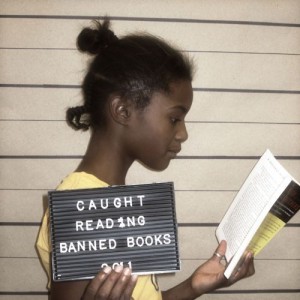Librarian Bans Blameless Book for Social Experiment
 Last weekend marked the end of Banned Books Week, the annual book readers’ celebration of drawing attention to the dangerous history of literary censorship. In 2014, the American Library Association (ALA) Office of Intellectual Freedom received 311 challenges. When an individual finds a book unacceptable for any reason, they are allowed to ask for the book’s withdrawal from circulation. This is called a “challenge.” Banned books, then, are books that were removed due to a successful challenge.
Last weekend marked the end of Banned Books Week, the annual book readers’ celebration of drawing attention to the dangerous history of literary censorship. In 2014, the American Library Association (ALA) Office of Intellectual Freedom received 311 challenges. When an individual finds a book unacceptable for any reason, they are allowed to ask for the book’s withdrawal from circulation. This is called a “challenge.” Banned books, then, are books that were removed due to a successful challenge.
BannedBooksWeek.org lists the year’s top ten most challenged works, and it includes such notable books as Sherman Alexie’s The Absolutely True Diary of A Part-Time Indian, Marjane Satrapi’s Persepolis, and Khaled Hosseini’s The Kite Runner.
While most people would say that they dislike the idea of creative censorship, one librarian found his community’s commitment to free expression lacking. After experiencing poor turnout to his 2012 Banned Books Week events, Mansfield University of Pennsylvania Director of Library and Information Resources Scott DiMarco decided to try a clever experiment.
In an article for The Conversation, DiMarco describes how he used flimsy pretense to challenge a popular local author’s book and then, being the school’s librarian, uphold his challenge and place it on a list of banned works. He chose Dennis R. Miller’s One Woman’s Vengeance and, in a two sentence memo on the library’s Facebook page, announced its inclusion on the banned book list.
The university librarian described the community’s reaction as “unexpected—and swift—in its vehemence.” Within a day, news outlets had contacted the banned author (who was in on the experiment) and a Facebook protest page had been set up.
In the end, the experiment proved far more successful in raising awareness for literary censorship than a week’s worth of programming.